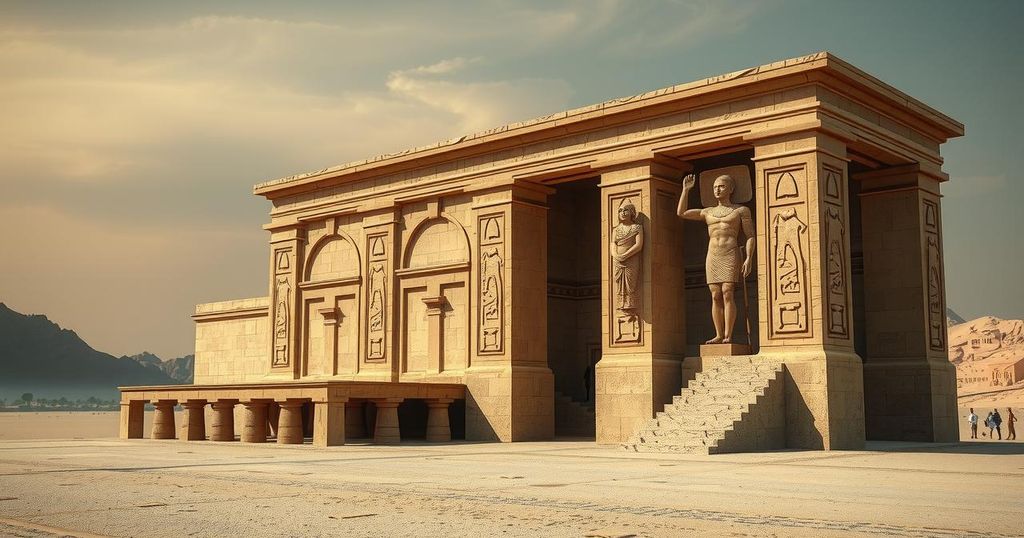Archaeological discoveries reveal that ancient Egyptians devised advanced drought responses, including increased grain production and resilient livestock breeding, in reaction to severe drought conditions between 1250 and 1100 B.C.E. This drought significantly contributed to the collapse of major MENA civilizations, underscoring the profound impact of climate change on societal stability and survival.
Recent archaeological findings indicate that ancient Egyptians had developed sophisticated strategies to address potential drought scenarios, as evidenced by digs in Israel, particularly in Megiddo and near the Sea of Galilee. Research published in the journal Egypt and the Levant by Tel Aviv University reveals that pharaohs initiated increased grain cultivation in more productive regions of the empire. Surplus food was distributed widely to promote social and political stability during crisis periods. Additionally, efforts were made to breed cattle better suited to endure arid conditions.
The Late Bronze Age, spanning from approximately 1250 to 1100 B.C.E., witnessed a severe drought across the Middle East and North Africa (MENA) region. This climatic shift resulted in agricultural failures that devastated local economies and populations, particularly in Egypt, which heavily relied on agriculture. The drought’s impact extended beyond the Nile River reaching regions of present-day Syria. Archaeological and climatic studies affirm the connection between this drought and the complexities surrounding the Bronze Age Collapse, during which numerous prosperous civilizations around the Mediterranean mysteriously declined.
The repercussions of this drought reached far and wide, contributing to the eradication of major civilizations, including the Egyptians, Babylonians, and Mycenaeans. These societies, known for significant advancements including early writing and trade networks, struggled to survive under the strain of environmental crises. According to findings reported by Knewz.com, the demise of these communities may have been linked to climate change, with their downfall demonstrating the severe consequences of ecological instability on human societies.
Prominent scholars note, “The Hittite Empire, Egypt of the pharaohs, the Mycenaean culture in Greece… all disappeared and only after a while were replaced by the territorial kingdoms of the Iron Age, including Israel and Judah.” In response to climatic challenges, the ancient Egyptians favored robust wheat varieties adaptable to extreme hydrologic conditions. During periods of low water flow, the Nile continued to serve as an effective transport route, facilitating trade and agricultural distribution amid challenging environmental conditions.
Professor Eric H. Cline of George Washington University encapsulated the situation stating, “There must have been a ‘perfect storm’ of calamitous events at that turning point to cause the Late Bronze Age civilizations to collapse shortly after 1200 BC.” He emphasized the relevance of historical drought responses in understanding the resilience of modern societies facing similar climatic adversities.
The topic focuses on the archaeological evidence discovered through systematic digs in Israel that illuminate the ancient Egyptian responses to climate change, particularly concerning drought preparation strategies. The research underscores the challenges faced during the Late Bronze Age when a significant drought contributed to the collapse of notable civilizations in the MENA region. This context is essential to comprehend how climate impacts formed the historical landscape and influenced societal resilience and adaptation over millennia. The Late Bronze Age Collapse serves as a critical case study illustrating the effects of environmental changes on socio-economic stability and the realities of human adaptation.
In summary, the archaeological evidence reveals that ancient Egyptians proactively implemented strategies to combat the effects of drought through increased agricultural production and cattle breeding tailored for harsh conditions. The severe drought of the Late Bronze Age not only decimated crops and livestock but also precipitated the decline of several advanced civilizations, raising important questions about the interplay between climate and societal sustainability. This historical perspective provides valuable insights for contemporary discussions on climate adaptation.
Original Source: knewz.com






